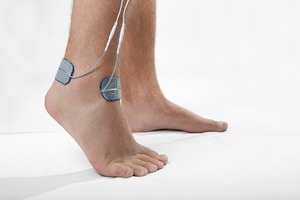Use TENS and EMS therapies for ankle sprain, strain or fracture
Ankle
The ankle joint is a hinge joint formed between the bones of the lower leg (tibia and fibula) and a bone of the foot (talus). It allows the foot to bend upwards and downwards and also facilitates a small amount of rotation.
The joint’s stability comes from the structural arrangement of the bones and the surrounding muscles and ligaments. Ligaments provide stability by preventing too much side to side movement.
Sprain
On the inside of the ankle the joint is stabilized by a thick, strong fibrous ligament called the deltoid ligament.
On the outside of the ankle, the joint is stabilized by three smaller ligaments. Sprains to any of the outside ligaments occur when the ankle is twisted inwards under pressure. These sprains account for more than 80% of all ankle sprains.
Strain
As the ankle twists the peroneal (lower leg) muscles and tendons are overstretched. Blood vessels are ruptured, the ankle and foot swell, causing further pain and incapacity.
Fracture
A complete tear of all ligaments may result in a dislocation of the ankle joint and an accompanying fracture. A Pott's fracture is a fracture to one of the bony parts of the ankle called the malleoli. Fractures can occur on the outside or the inside of the lower leg.
SportsMed TENS therapy for Ankle joint
After a diagnosis of ankle sprain or peroneal damage, your ankle injury management plan should include physical therapy treatment as often as possible.
SportsMed is the TENS, ECS and EMS machine we suggest to aid repair of an ankle injury.
SportsMed electrotherapy can be used everyday - outside the clinic - for drug-free, on-demand pain relief. It is also designed and programmed to aid circulation, reduce inflammation, hasten healing and help with peroneal muscle rehabilitation.
User guide
Please read the User Guide which comes with your TENS unit
Pad placement - Ankle injuries
Pain relief - place pads where they are comfortable and most effective for pain relief
Injury healing - pads are placed at the location of the injury
Muscle rehabilitation - the generic advice is to place one pad at the top of the muscle and the second pad one-third along the length of the muscle you wish to strengthen. You may need to consult your physiotherapist for specific guidance on which muscles to target.
Ankle sprain
peroneal muscle rehabilitation
If you have any questions please phone our office for further advice.



